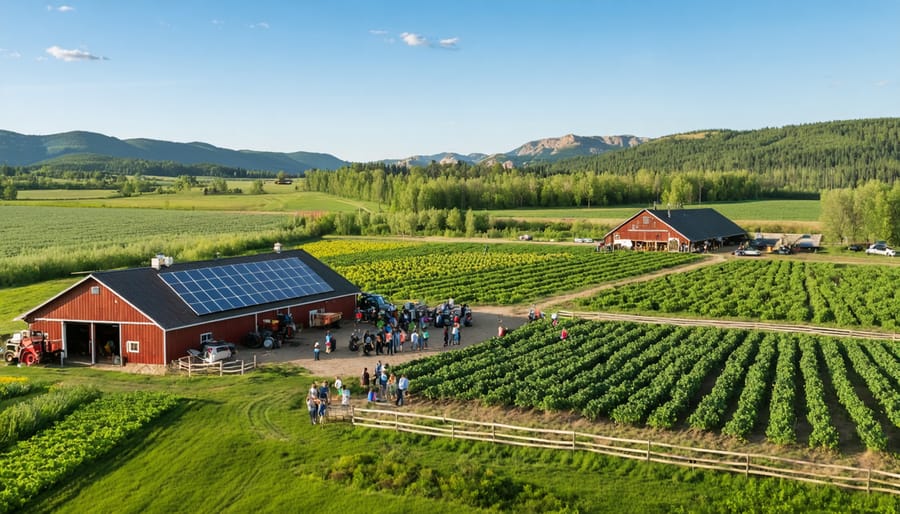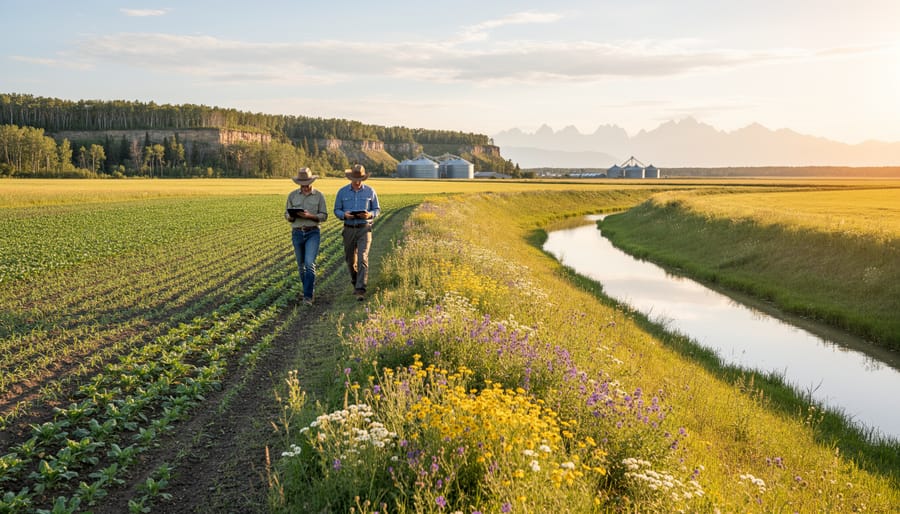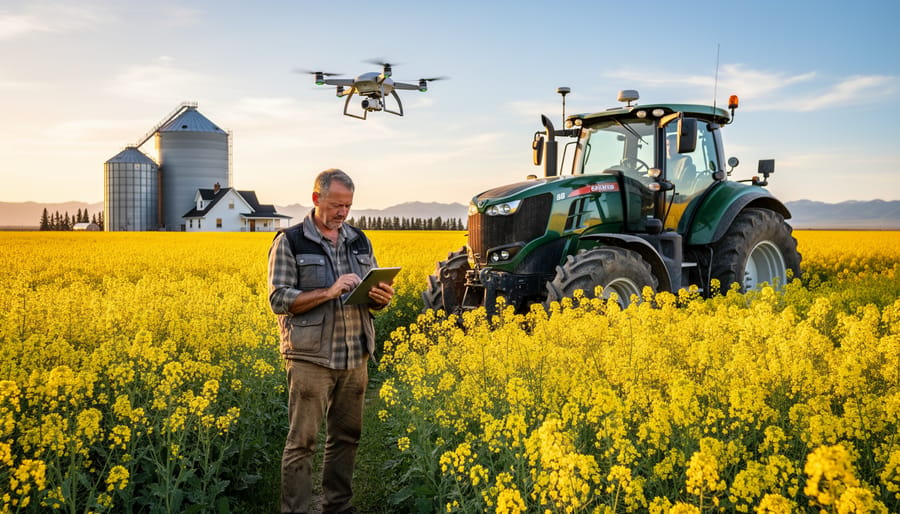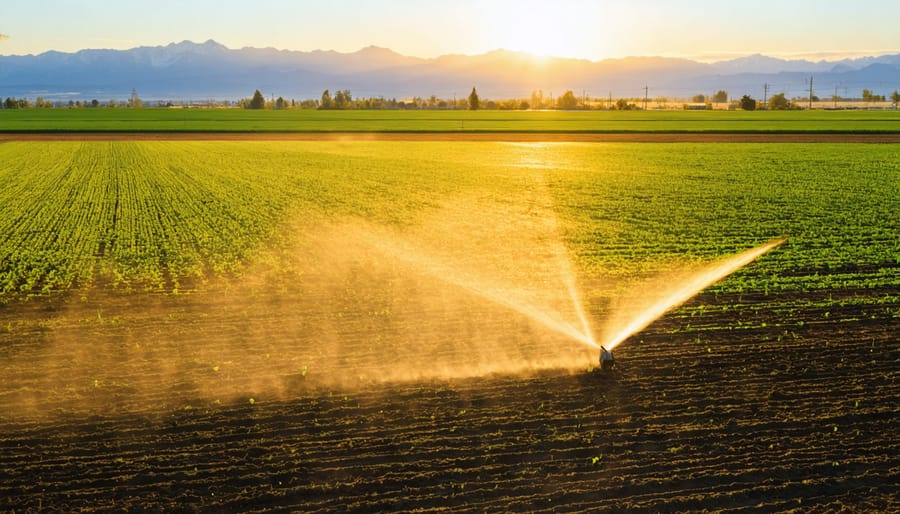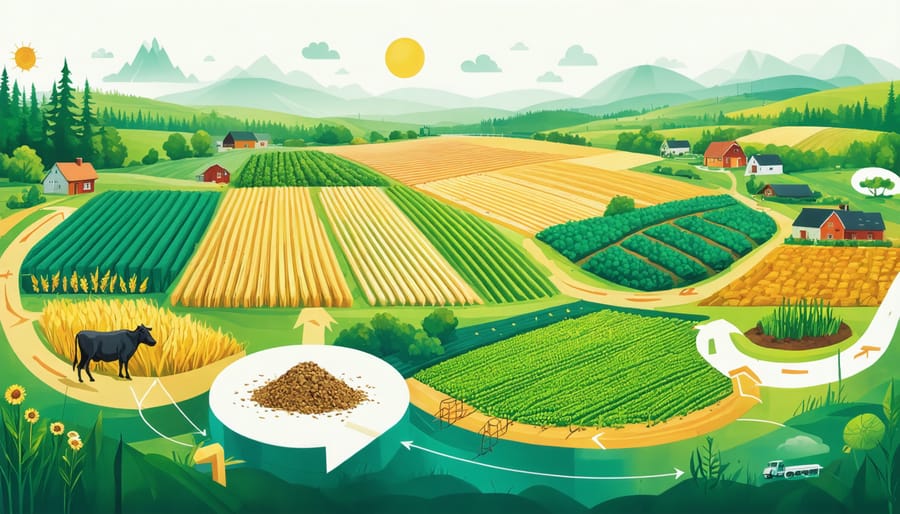Transform your farm into a thriving eco-tourism destination by implementing sustainable practices that connect visitors with authentic agricultural experiences. Across rural development in Alberta, farmers are pioneering innovative approaches that combine environmental stewardship with profitable tourism ventures. From guided farm-to-table experiences to interactive livestock demonstrations, Canadian agricultural operations are setting new standards in responsible tourism while preserving our natural heritage.
Successful eco-tourism initiatives demonstrate how traditional farming practices can evolve to meet growing consumer demand for authentic, sustainable experiences. These ventures not only diversify farm income but also educate visitors about sustainable agriculture, creating a ripple effect of environmental awareness throughout the community. By showcasing working farms that protect biodiversity, implement renewable energy solutions, and maintain indigenous ecosystems, we’re building a future where agriculture and tourism work in harmony to benefit both the environment and local economies.
Farm-to-Table Tourism Success Stories
Prairie Gardens Adventure Farm
Located just north of Edmonton, Prairie Gardens Adventure Farm has successfully transformed a traditional farming operation into a thriving agri-tourism destination that welcomes over 50,000 visitors annually. The farm combines sustainable agricultural practices with immersive visitor experiences, creating a model for eco-tourism in Alberta’s agricultural sector.
Owners Tam and Ken Birkigt have implemented several innovative sustainable practices, including organic growing methods, water conservation systems, and waste reduction initiatives. Their approach includes rotating crops across 35 hectares of land while maintaining areas for educational demonstrations and hands-on farming experiences.
Visitors can participate in seasonal activities like pumpkin harvesting, corn maze adventures, and berry picking, all while learning about sustainable farming practices. The farm offers guided tours that showcase their composting system, natural pest management techniques, and heritage seed preservation programs.
What sets Prairie Gardens apart is their commitment to educational programming. They partner with local schools to provide agricultural literacy programs and host workshops on sustainable farming practices for both hobbyist gardeners and professional farmers. Their farm-to-table events feature produce grown on-site, demonstrating the direct connection between sustainable agriculture and local food systems.
The farm’s success demonstrates how agricultural operations can diversify their income streams while promoting environmental stewardship and community engagement. Their model has inspired numerous other Alberta farms to explore similar eco-tourism initiatives.

The Saskatoon Berry Farm Experience
Located just outside Edmonton, the Thompson Family Farm’s transformation from a traditional saskatoon berry operation to a thriving eco-tourism destination showcases the potential of agricultural diversification. In 2015, Sarah and Mike Thompson noticed a growing interest from urban visitors seeking authentic farm experiences and decided to embrace this opportunity while maintaining their sustainable farming practices.
The farm now offers guided berry-picking tours where visitors learn about organic growing methods and the cultural significance of saskatoon berries to Indigenous peoples. Their innovative approach includes educational workshops on sustainable farming practices, seasonal cooking classes using farm-fresh ingredients, and hands-on preservation techniques.
A key element of their success has been the development of nature trails through their 40-hectare property, allowing visitors to observe native wildlife and learn about local ecosystems. The Thompsons also implemented solar panels to power their processing facility and installed rainwater collection systems for irrigation.
The farm hosts regular community events, including an annual harvest festival that draws over 2,000 visitors. Their on-site store features locally made products, and they’ve partnered with nearby farms to create a regional food tourism network. This transformation has increased their revenue by 175% while reducing their environmental impact through sustainable practices.
The Thompsons now mentor other farmers interested in eco-tourism, sharing their experience of balancing agricultural production with visitor experiences. Their success demonstrates how traditional farming can evolve to meet changing consumer interests while protecting the environment.
Wildlife and Conservation Tourism

Bird Watching Initiatives
Alberta farmers are discovering the remarkable potential of bird watching initiatives as a unique eco-tourism venture. By incorporating wildlife conservation practices into their operations, farms across the province are creating thriving bird sanctuaries that attract both local and international visitors.
The McNally Creek Farm near Red Deer serves as an inspiring example, having transformed 40 hectares of wetland into a haven for migratory birds. Their guided tours now welcome over 2,000 visitors annually, offering dawn and dusk viewing experiences of native species like the Great Blue Heron and Northern Pintail.
Several farms have partnered with local ornithological societies to develop educational programs and proper viewing facilities. These typically include elevated observation platforms, photography blinds, and interpretive trails with informative signage about local bird species and their habitats.
The economic benefits have been significant. Farms offering bird watching tours report additional revenue streams of $15,000 to $30,000 annually, with minimal infrastructure investment required. Many have expanded their offerings to include photography workshops, educational school trips, and seasonal migration festivals.
To support this initiative, the Alberta Farmland Trust provides resources and guidance for farmers interested in developing bird sanctuaries. Their mentorship program connects experienced operators with newcomers, fostering a collaborative approach to eco-tourism development while ensuring responsible environmental stewardship.
Native Prairie Conservation Tours
Native prairie conservation tours have emerged as a compelling eco-tourism initiative across Alberta’s grasslands, offering visitors an authentic glimpse into one of Canada’s most threatened ecosystems. Several successful programs, like the Waterton Biosphere Reserve tours, showcase how agricultural operations can coexist with natural prairie landscapes while generating additional income for farming families.
Local ranchers and farmers lead these educational experiences, sharing their knowledge about sustainable grazing practices, native plant species, and wildlife conservation. Visitors can observe bison grazing patterns, learn about indigenous prairie plants, and understand how modern farming techniques can support ecosystem preservation.
The Medicine River Wildlife Centre, located near Red Deer, demonstrates how conservation tourism can benefit both wildlife and agricultural communities. Their guided tours highlight the delicate balance between farming operations and preserving critical habitat for prairie species like the burrowing owl and swift fox.
Many participating farms have developed viewing platforms and interpretive trails that allow tourists to observe native grasslands without disturbing the ecosystem. These installations typically require minimal infrastructure while providing maximum educational value. Seasonal tours are particularly popular during spring wildflower blooms and fall migration periods.
For farmers considering this venture, the Alberta Prairie Conservation Forum offers resources and networking opportunities with established operators. Success stories show that conservation tours can generate between $15,000 to $30,000 annually in supplemental income while contributing to broader environmental education and preservation goals.
Educational Agri-Tourism
Sustainable Farming Workshops
At the heart of Alberta’s eco-tourism movement, interactive farming workshops are transforming how visitors experience agricultural life. These hands-on programs invite participants to learn sustainable farming methods directly from experienced local farmers.
Visitors can participate in seasonal activities like seed starting in spring, companion planting in summer, and harvest celebrations in fall. Popular workshops include composting techniques, natural pest management, and soil health improvement through cover cropping. Each session typically runs for 2-3 hours, allowing participants to get their hands dirty while learning practical skills they can apply at home.
The Mountain View Farm Collective near Calgary offers weekly workshops where tourists work alongside farmers to learn about crop rotation, water conservation, and organic certification requirements. Participants often report that these experiences deepen their connection to food production and local agriculture.
These workshops also serve as valuable networking opportunities for farmers interested in transitioning to organic methods. Many workshop hosts have successfully integrated tourism with their farming operations, creating additional revenue streams while educating visitors about sustainable agriculture.
To maintain authenticity and quality, workshop sizes are usually limited to 12-15 participants, ensuring personalized attention and meaningful learning experiences. Most programs include take-home resources and ongoing community support through social media groups and seasonal newsletters.
School Programs and Youth Engagement
School programs have become a cornerstone of successful eco-tourism initiatives across Alberta farms, creating meaningful connections between young learners and sustainable agriculture. The Prairie Rose School Division’s “Farm to School” program exemplifies this approach, bringing over 1,200 students annually to participating farms where they learn about crop rotation, composting, and traditional Indigenous farming practices.
Several Alberta farms have developed structured educational programs that align with the provincial curriculum. The Henderson Heritage Farm near Red Deer offers hands-on workshops where students can participate in seasonal activities like maple syrup tapping in spring and pumpkin harvesting in fall. These programs typically run for 2-3 hours and accommodate groups of 20-30 students.
Local farmers report that youth engagement programs not only provide additional revenue streams but also help build community support for sustainable farming practices. The Mountain View Farm Collective, for instance, hosts weekly after-school programs where children aged 8-12 maintain their own garden plots and learn about organic farming methods.
To support these initiatives, the Alberta Farmers’ Association offers resource kits and training for farmers interested in developing educational programs. These kits include age-appropriate activity guides, safety protocols, and suggested lesson plans that integrate agricultural education with environmental stewardship. The success of these programs has led to waiting lists at many participating farms, demonstrating the growing demand for hands-on agricultural education experiences.

Starting Your Farm’s Eco-Tourism Journey
Essential Infrastructure and Planning
Before welcoming visitors to your farm, certain fundamental infrastructure and planning elements need to be in place. Start by ensuring your property meets all local health and safety regulations, including proper washroom facilities and designated parking areas. Consider installing clear signage for directions, safety guidelines, and educational information about your sustainable farming practices.
Develop a visitor management plan that outlines maximum group sizes, booking procedures, and emergency protocols. Most successful eco-tourism farms in Alberta maintain visitor numbers between 15-30 people per tour to ensure quality experiences while minimizing environmental impact. You’ll need adequate insurance coverage specifically for agri-tourism activities.
Basic amenities should include rest areas, weather protection, and accessible pathways suitable for various mobility levels. If you’re planning hands-on activities, ensure you have proper equipment and safety gear available. Many farms find success by starting small and expanding gradually, allowing them to access financial support for eco-tourism initiatives as they grow.
Remember to create designated areas that can withstand frequent visitor traffic while protecting sensitive farming zones. This might include specific demonstration areas, designated walking trails, or observation points that showcase your sustainable practices without compromising farm operations.
Marketing Your Eco-Tourism Experience
Marketing your eco-tourism venture doesn’t have to be complicated or expensive. Start by creating a strong online presence through social media platforms like Instagram and Facebook, where you can showcase your farm’s unique experiences and stunning natural landscapes. Many successful Alberta farm tourism operators have found that high-quality photos and engaging stories about daily farm life generate significant interest.
Partner with local tourism boards and agricultural associations to expand your reach. The Alberta Farm Fresh Producers Association and Travel Alberta often promote authentic farm experiences to both domestic and international visitors. Consider joining regional food or agriculture trails that can bring established tourist traffic to your door.
Word-of-mouth remains powerful in rural communities. Encourage visitors to share their experiences online and offer incentives for referrals. Create memorable moments that guests will want to photograph and share, such as sunrise yoga in your wheat field or harvest-time activities.
Local media outlets are often interested in innovative agricultural stories. Build relationships with regional journalists and invite them to experience your eco-tourism offerings firsthand. Collaborate with other local businesses, like restaurants using your produce or nearby accommodations, to create compelling package deals that attract visitors to your region.
Remember to highlight your sustainable practices and educational components in all marketing materials, as these elements strongly appeal to eco-conscious travelers.
Farm-based eco-tourism represents a promising opportunity for Alberta’s agricultural community, offering a sustainable way to diversify farm income while promoting environmental stewardship and cultural preservation. The success stories we’ve explored demonstrate how farmers across the province have successfully integrated tourism activities with traditional farming practices, creating memorable experiences for visitors while maintaining their agricultural operations.
The benefits extend far beyond individual farms, contributing to rural economic development, preserving local heritage, and fostering a deeper connection between urban and rural communities. By opening their gates to visitors, farmers not only create additional revenue streams but also become ambassadors for sustainable agriculture and environmental conservation.
Looking ahead, the potential for growth in farm-based eco-tourism appears strong, particularly as more Canadians seek authentic, educational, and environmentally conscious travel experiences. The increasing interest in local food systems and sustainable farming practices suggests a continuing upward trend for this sector.
For farmers considering this path, the key to success lies in thoughtful planning, community engagement, and a commitment to sustainable practices. By leveraging existing resources, incorporating Indigenous knowledge where appropriate, and maintaining high standards of environmental stewardship, Alberta’s farms can continue to lead the way in agricultural tourism innovation.
As we move forward, farm-based eco-tourism will play an increasingly vital role in supporting sustainable agriculture while providing valuable educational opportunities for visitors and stable income diversification for farming families.

